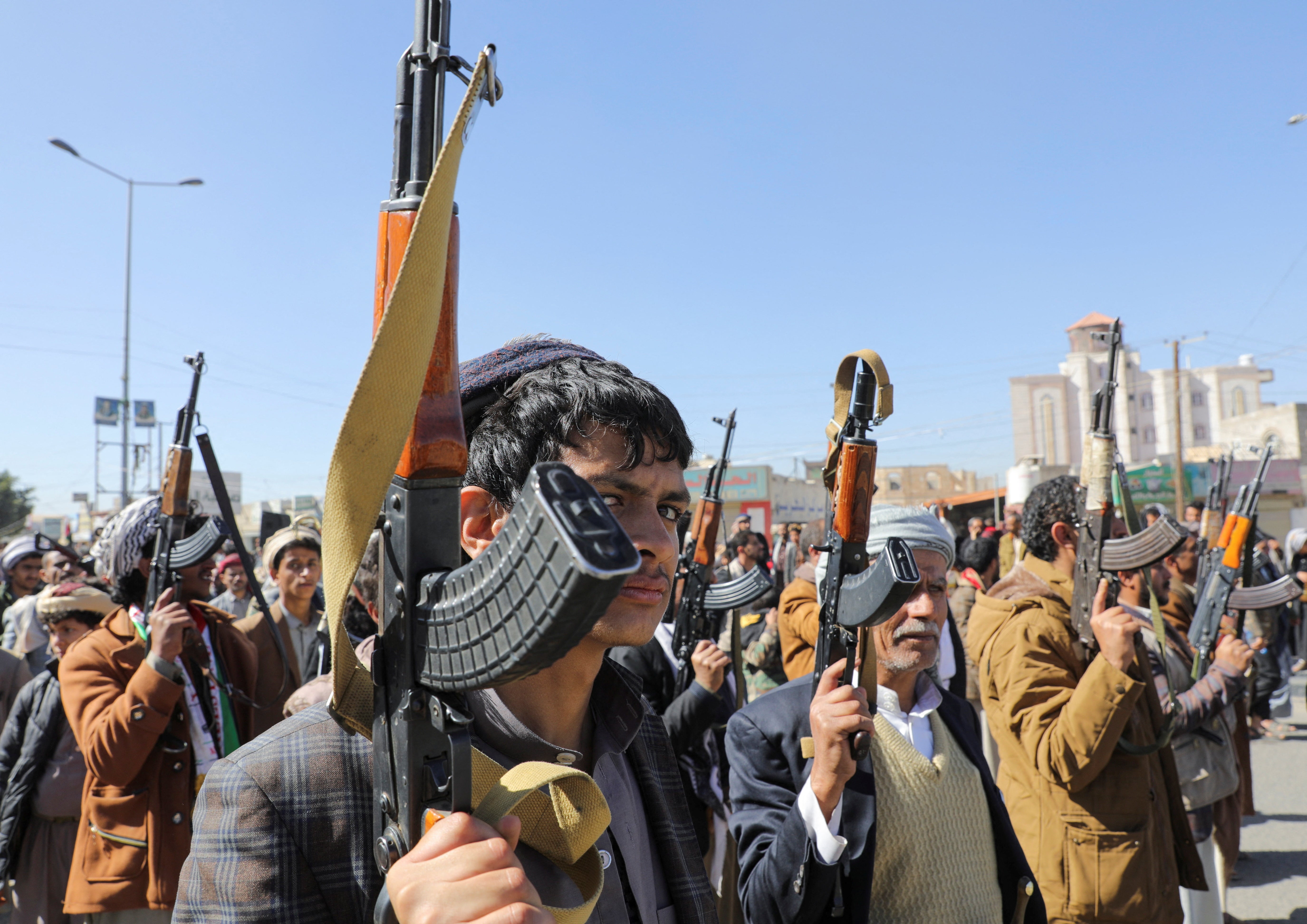Houthi rebels won’t be stopped by a single raid – we must hit them again
When it comes, the Iran-backed militia’s retaliation on the West will be defiant, to show the world they are undefeated, says General Sir Richard Barrons. It might also prove to be the next salvo in a wider conflict between global powers


After some traditional political and media choreography, the US and the UK last night attacked 16 sites in Yemen with a combination of bombs and missiles fired from at sea and in the air.
This action was supported by several other states, including some in the region, allowing four Typhoon jets to fly to Yemen from Cyprus, no doubt refuelling in the air en route. The objective was to destroy some of the launch sites, ammunition dumps, and command and control facilities that have enabled the Houthis to attack international shipping in the Red Sea on 26 occasions since last November.
Will the Houthi attacks now stop, or continue – and might this action lead to an escalation of the current crisis in the Middle East centred on Gaza?
From the US-UK military perspective, the strikes will have been very carefully constructed to have a substantive effect on Houthi drone and missile capability, but there will be no expectation that they destroyed it all. It is also certain that the Houthis are not easily deterred, having faced down bombing by Saudi Arabia and its allies between 2015 and 2022.
An apology and a promise not to do it again are not on the cards. In fact, we should expect a defiant response, which will most likely include at least some further attacks to show the rebels are not defeated. Things might then settle down.
But this uncertainty means that the US and its partners, including the UK, must be prepared to attack Yemen again. The strikes were pronounced as “necessary and proportionate” by Rishi Sunak because of the damaging effect the Houthis are having on international freedom of navigation in the Red Sea. Their drone and rocket attacks on cargo ships have prompted a 20 per cent downturn in global container trade, which has direct consequences for UK prosperity.
There really are vital national interests at stake here. Giving up after just one round is therefore not a credible option. It would merely underline real strategic weakness after a tactical show of strength.
Following Western intervention, even if the Houthis retain some capacity to mount new attacks, will they – and, much more importantly, will Iran think they should?
We know that every drone and missile fired at ships in the Red Sea was made in Iran. It appears certain that Iran has also supported the Houthis with identifying targets, as some of the missiles used have a range of 800km.
The Houthis have claimed their action is aimed only at stopping ships heading for Israel, but missiles and drones have been flown at international shipping and, latterly, at US and UK naval vessels. Iran uses its proxy in Yemen to disrupt US-led support to Israel, and to enhance Iran’s influence across the Middle East.
What happens next is much more likely to be decided in Tehran than Sanaa.
Fortunately, it seems clear that, for the moment, Iran has no interest in seeing the conflict in Gaza or its provocations in the Red Sea, Iraq and Syria escalate into a war between the US and Iran. We should certainly expect to see Iran’s many proxies, including the Houthis and Lebanese Hezbollah, attacking Israeli and US interests, but for this to be calibrated to stay below a level that provokes all-out conflict.
The vital question in the Red Sea today is whether Iran still sees Houthi attacks on international shipping as a useful part of unsettling US-led interests, or does it judge there is now just too much risk in going further?
On the one hand, given the high risks that attach to further escalation of any conflict in the Middle East, and huge uncertainty about what the beneficial outcomes would really be, the most likely and rational expectation is that the Red Sea will settle at some sort of uncomfortable but tolerable threshold.
On the other hand, there are extremists in both Israel and Iran who do see the current situation as their best opportunity to take massive and decisive action to fundamentally change boundaries, borders and the balance of power in the region. Should these elements hold sway, what happens next will be a much more violent, unscripted ride for everybody. It is not where we are today.
There is another vital dimension to this, which is the developing sense of ostensibly separate issues in Ukraine, Gaza and possibly Taiwan becoming connected, in a deepening, enduring confrontation between the US-led West on the one hand and Russia, Iran and – perhaps in the background for now – great forces such as China on the other.
Russia, for example, has raised the strikes on Yemen in the UN Security Council, and while this is no doubt for its own purposes, it illustrates how things are woven together.
If what we have just seen in the Red Sea is an early shot in a profoundly high-risk – and avoidable – conflict between great power blocs, 2024 is going to need supremely careful management to not feel like 1939.
General Sir Richard Barrons is a former deputy chief of the defence staff and former commander of the Joint Forces Command






Join our commenting forum
Join thought-provoking conversations, follow other Independent readers and see their replies
Comments